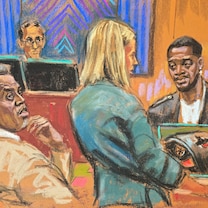How Scientology Attracts Celebrities
Church sought to attract high-profile figures as "walking success stories."
Oct. 24, 2009 — -- Celebrities and the Church of Scientology seem to go hand-in-hand. And actor Tom Cruise is arguably the world's best-known celebrity Scientologist.
"She goes, 'I don't really understand who you are,'" Cruise says in a video made for a Scientology event that was leaked onto the Internet last year. "And I said, 'OK, I'm a Scientologist.'
"There's nothing part of the way for me," Cruise says on the video, laughing. "It's just [makes voom sound]."
Tom Cruise first burst onto the scene in a pair of white socks, and not much else, in "Risky Business." Then he was fighter pilot, a bartender, and by the time he appeared in "Jerry Maguire," he'd become the most successful movie star on the planet -- and deeply involved in Scientology.
Amy Scobee was a member of Scientology for 27 years. She was a Church executive who helped expand Scientology's outreach to celebrities. She spoke with "Nightline."
Nightline: ...Presbyterian Church doesn't have a wing that emphasizes reaching celebrities ...Why do you think there was this emphasis on celebrity?
Scobee: ...One of the purposes of Celebrity Centre is to make celebrities walking success stories of Scientology.
Tommy Davis is the director of public affairs for the Church of Scientology. His mother is the actress Anne Archer, who was nominated for an Academy Award for her role as a betrayed housewife in the movie "Fatal Attraction."
Nightline: ...Why was there this exceptional approach to celebrities?
Davis: Well...
Nightline: What's the purpose of that?
Davis: What you have in Scientology is you have a lot of artists who are Scientologists. Some of them are well known. ...the Celebrity Centre, which is that arts and culture branch of the Church first began, it was actually started and founded by and gotten going by Scientologists who are artists.
Scientology was founded by science fiction author L. Ron Hubbard in the early 1950s. One of the key practices is "auditing," which is a kind of counseling session in which a person's unconscious thoughts from painful experiences are purged, often with the help of a trained auditor and a device known as an "e-meter."
Bruce Hines left the Church in 2003 after 24 years.
Hines: This e-meter, this electrometer, which works on the same principle as a lie detector, even though they say, "No, this isn't a lie detector." But it's the exact same principle.
Nightline: But it indicates some kind of electrical pulse?
Hines: It sends a current through your body. ... And the theory is is that when you have emotional charge ... it changes the resistance of the body. So that changes the current. And that ... and it makes this needle move.
"Nightline" spoke with Tommy Davis.
Nightline: Has the e-meter ever been subjected to randomized clinical trials to assess its efficacy?
Davis: I have no idea. I don't know why it would be. It works in Scientology and that's what people use it. I don't know why it would be subjected to random clinical trials.
Nightline: Because it's a...a mechanism for therapeutic care you just said...
Davis: In a religion.
Nightline: But has it ever been tested objectively is what I'm asking?
Davis: I mean it gets used every day by Scientology counselors.
Nightline: I'm not asking that. I'm asking...
Davis: To my knowledge, no. ...And as far as evidence of the e-meter and its efficacy, the evidence of that is in those Scientologists who have used it to great benefit. And as far as the Church of Scientology is concerned, it's the only evidence that matters, is the people and the results.
From the start, L. Ron Hubbard set out to attract celebrities, believing high profile public figures would be its most effective evangelists.
Nightline: Can you recall any celebrities who came into the Centre when you were there?
Scobee: I met John Travolta, Kelly Preston, Priscilla Presley, Lisa Marie, Edgar Winter, Isaac Hayes, uh, Tom Cruise.
After Hubbard died in 1986, David Miscavige became the Church's leader -- and soon embraced Tom Cruise with great fervor.





